
Posted on 03/09/2012 10:51:08 AM PST by JustaDumbBlonde

.
Good afternoon gardeners! After a high of 81 degrees yesterday, we are at 50 degrees today after experiencing high winds and 3 inches of rain last night. Radar would indicate that there is more rain to come, as I see it in Texas right now. I hope that all of our Texas gardeners are catching up on much needed rain! PTL!
We have so many new gardeners in our group, in addition to folks with the desire to begin gardening, that I thought a primer on transplanting might be useful. Please feel free to add to the discussion with your regular practices. And, as always, please feel free to ask any questions that you may have. This group loves to share information, and advice is free for the asking!
Because I plant over 100 tomato plants every year, I've got my transplanting down to a science that works for me and allows me to move down the row quickly. My tools are a bulb planter, a old spoon from the kitchen, a small bucket and several 2-liter soda bottles. (One day I'd love to do a thread on all of the common non-garden-related items we all use in our gardens.)
I start off my mixing up several bottles of a starter fertilizer, either the TNT pictured below, or Miracle Grow Quick Start. Whatever you use, make sure it is a low-nitrogen product, or you will grow lovely leaves and not much else. I also put some tomato food around the base of the tomato after transplant. Please notice the N-P-K formulation on these products. Similar products from any manufacturer are fine, these are what stores in my area offer for sale.
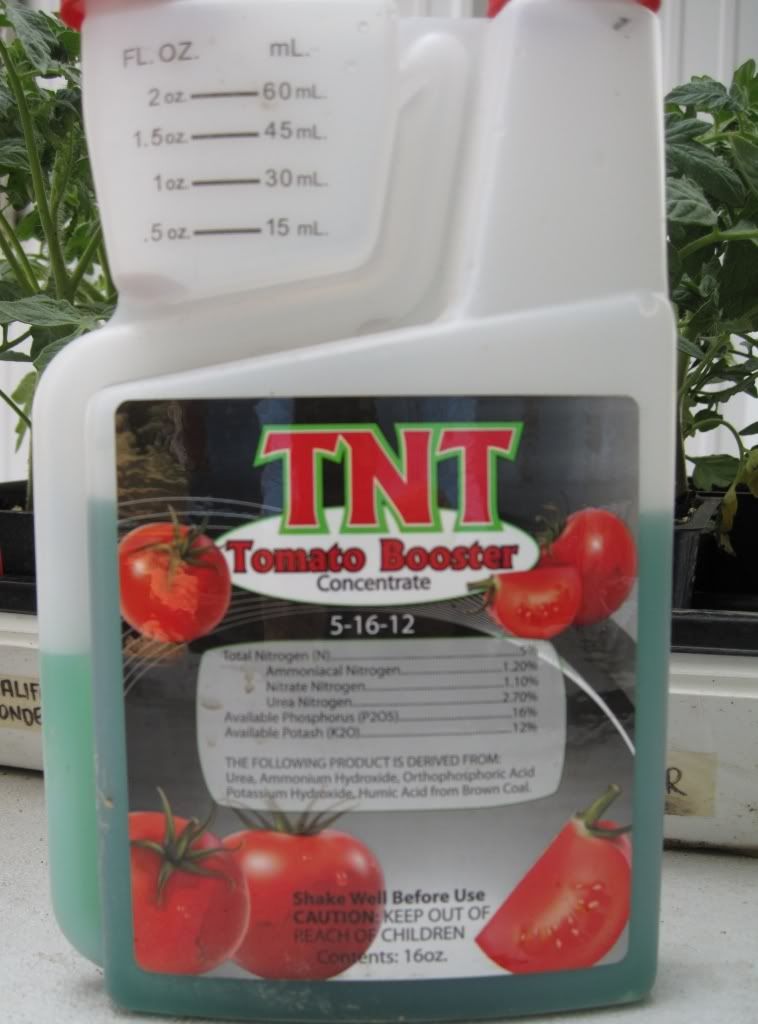
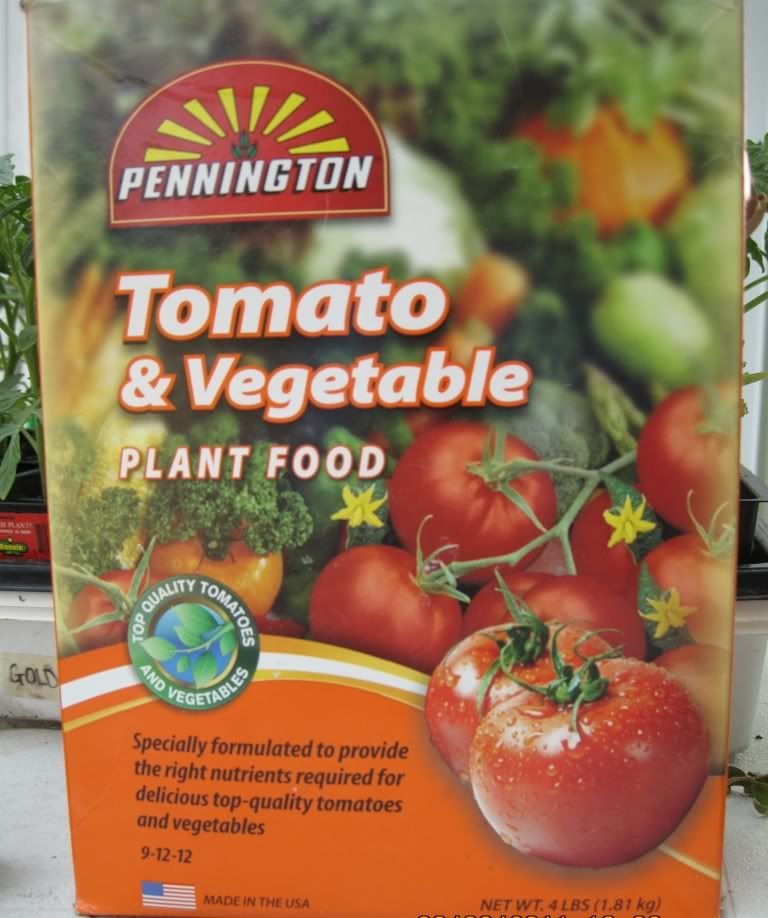
My tomatoes are planted through a commercial quality landscape fabric for weed control and moisture retention. It has other benefits, but weed control is my major concern. I begin by measuring off 30 inch increments and marking them on my fabric, then I go back and cut X's in the fabric and fold the corners under to access the soil.
Begin by digging your hole. I use a bulb planter because it makes the perfect diameter hole for a transplant that comes from a commercial 6-9 pack, or the small newspaper pots that I make myself. Tomatoes should be planted "deep", so dig your hole accordingly.
Here is an example of a bulb planter:
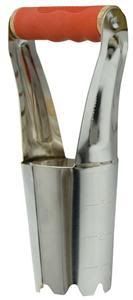
By "deep", I mean that you are going to plant more than just the roots, you are going to plant at least half of the stalk as well, up to 3/4 of the height of the plant is perfectably acceptable. Bonnie Plants, which supplies the likes of WalMart, Lowes and Home Depot garden centers, used to suggest 80% of the plant stem, but they have since backed that off to 2/3. This method is really the ONLY way to grow the strongest possible plant. Roots will develop on the entire length of the stem that is buried, giving your plants lots of roots to anchor the plant, as well as the ability to absorb more moisture and nutrients. In the photo below, the top of my index finger is indicating how deep I'm going to plant this tomato.
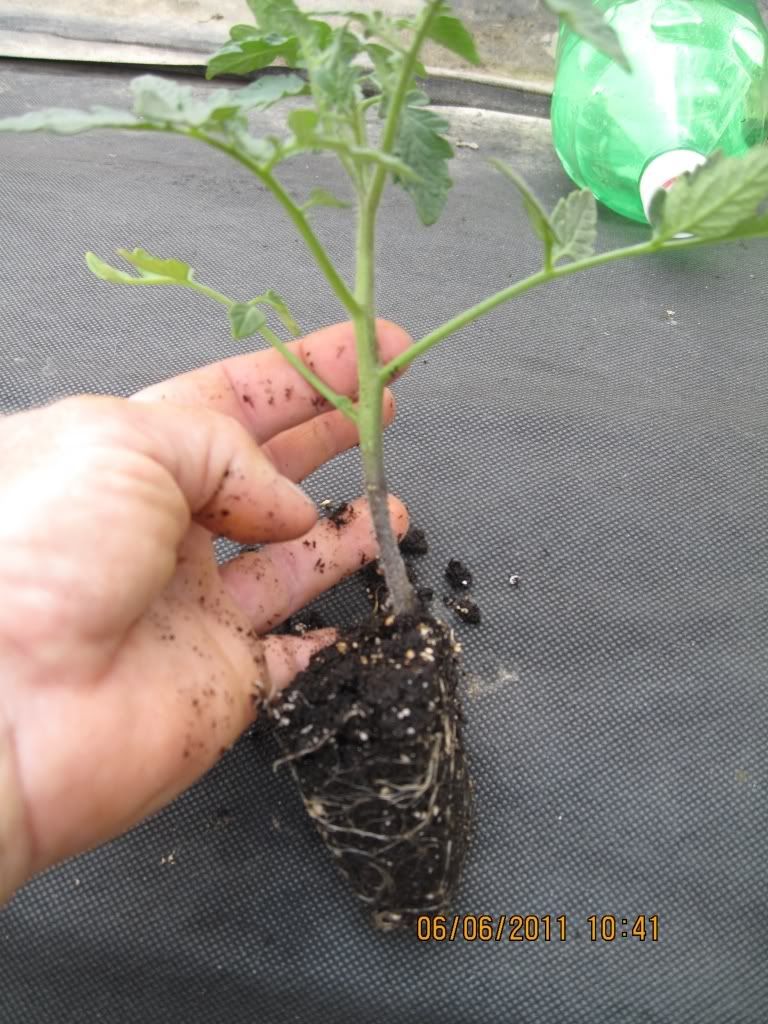
The next photo shows that I have pinched-off the leaves of the plant up to the point that I will bury the stem. This is not a required step, many folks let them stay, but it is my personal preference to remove them to avoid air pockets around the new roots.
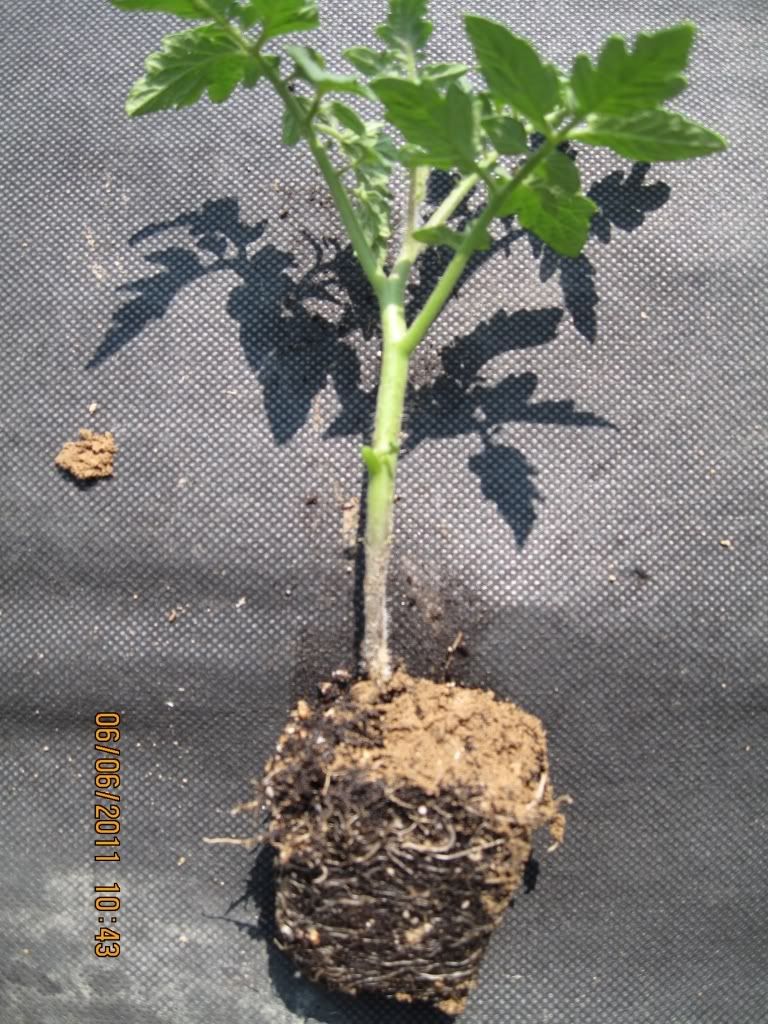
Next, gently place your plant in the hole you've prepared. You can see from the photos below that there is enough room in the hole to surround the delicate roots with looser soil to accomodate quick spread and avoid transplant shock.
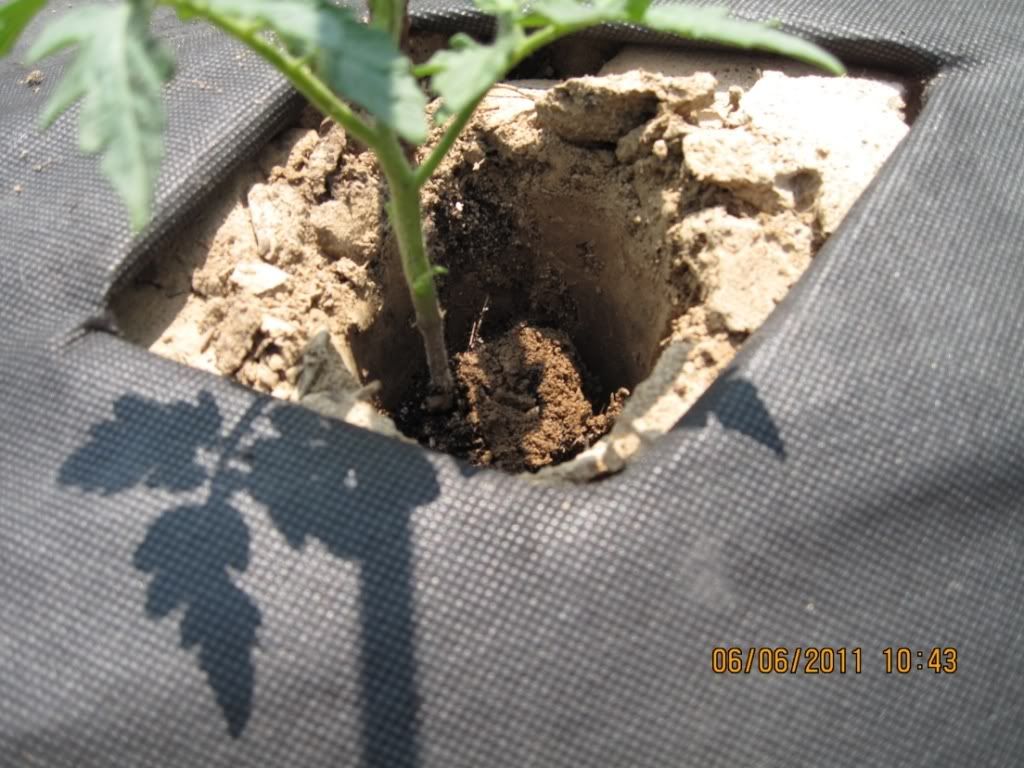
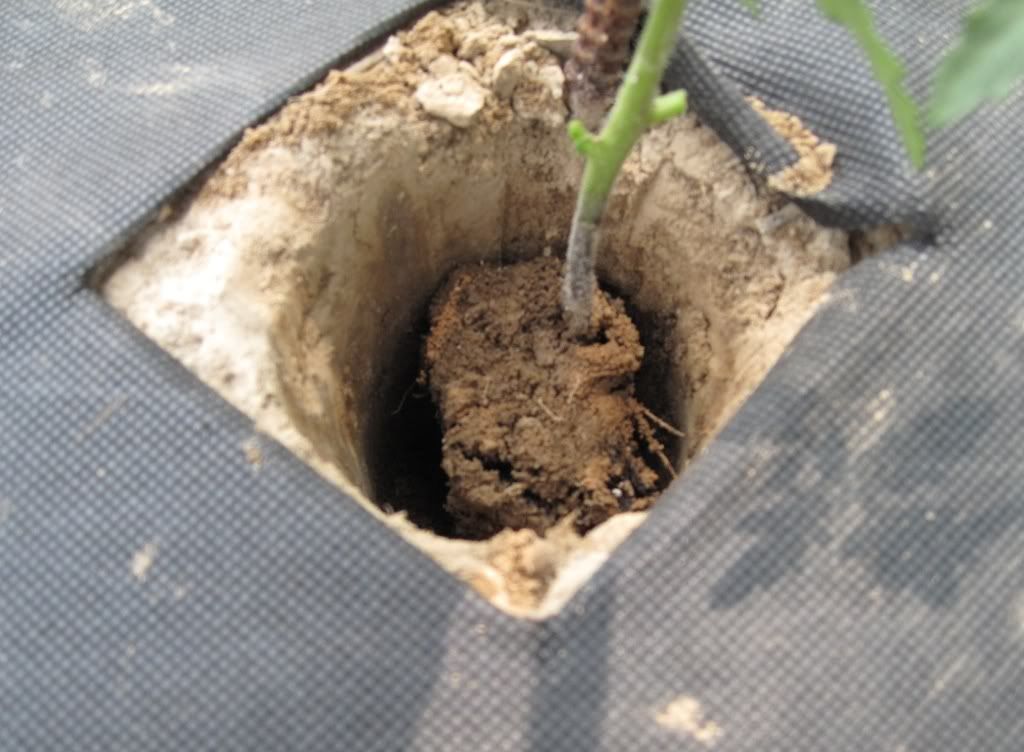
In the next step, you should replace the soil you removed with the bulb planter, just enough to cover the existing rootball. I use the small bucket to break up the soil and hold it until I'm ready to put it back. If you're not working on landscape fabric, of course you can keep the soil on the ground next to the hole. The important thing is making sure you break it up well.
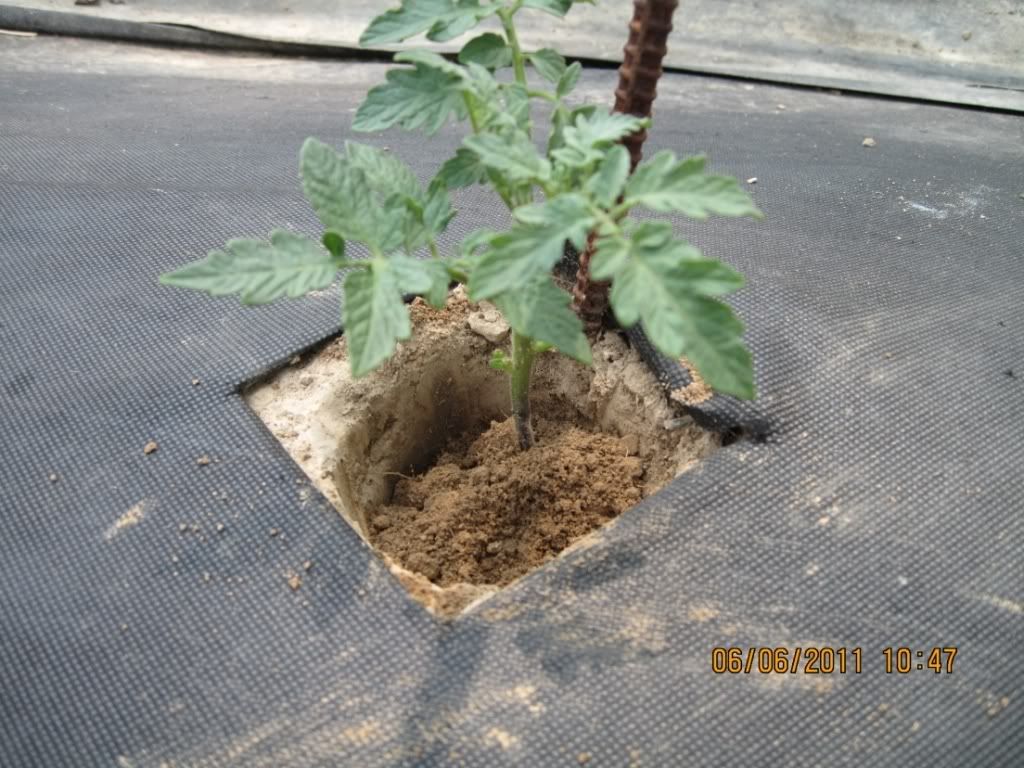
Then water that soil in with your starter fertilizer/water mixture. Water until the loose soil is underwater and then allow it to soak in. It only takes a minute or less.
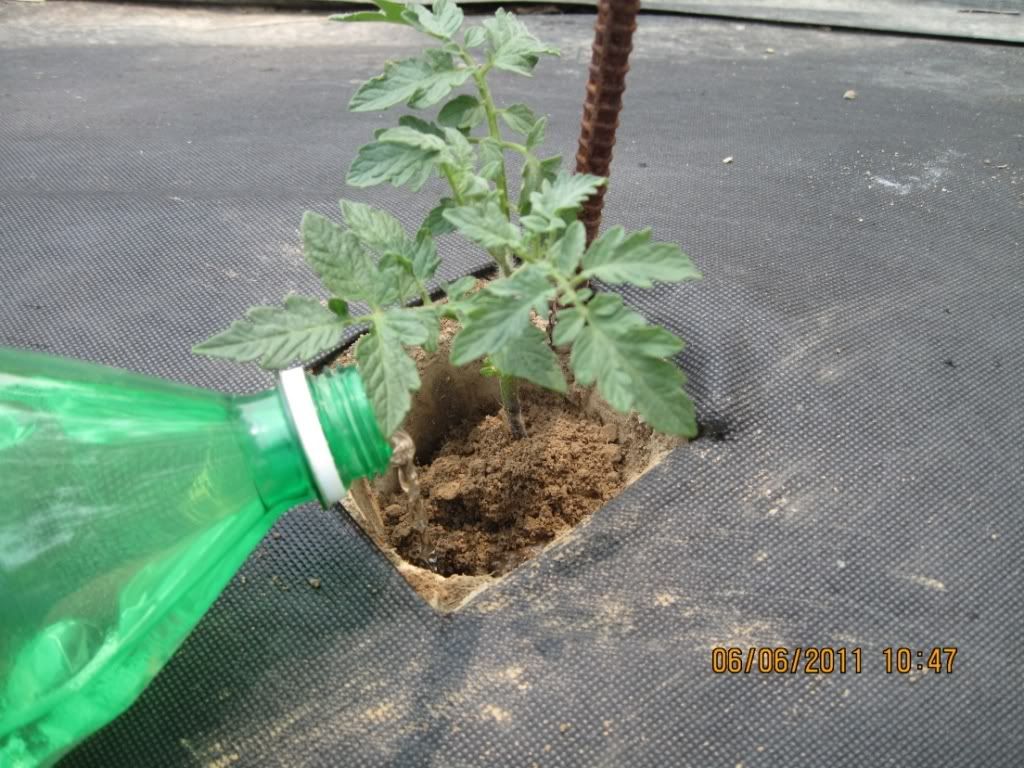
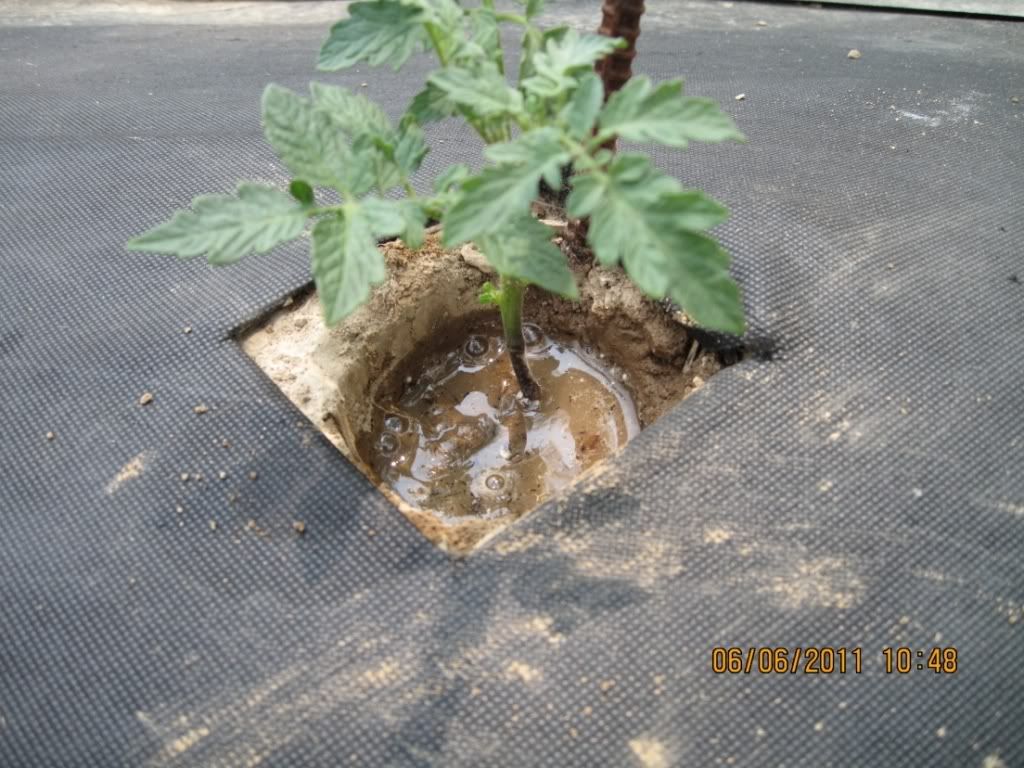
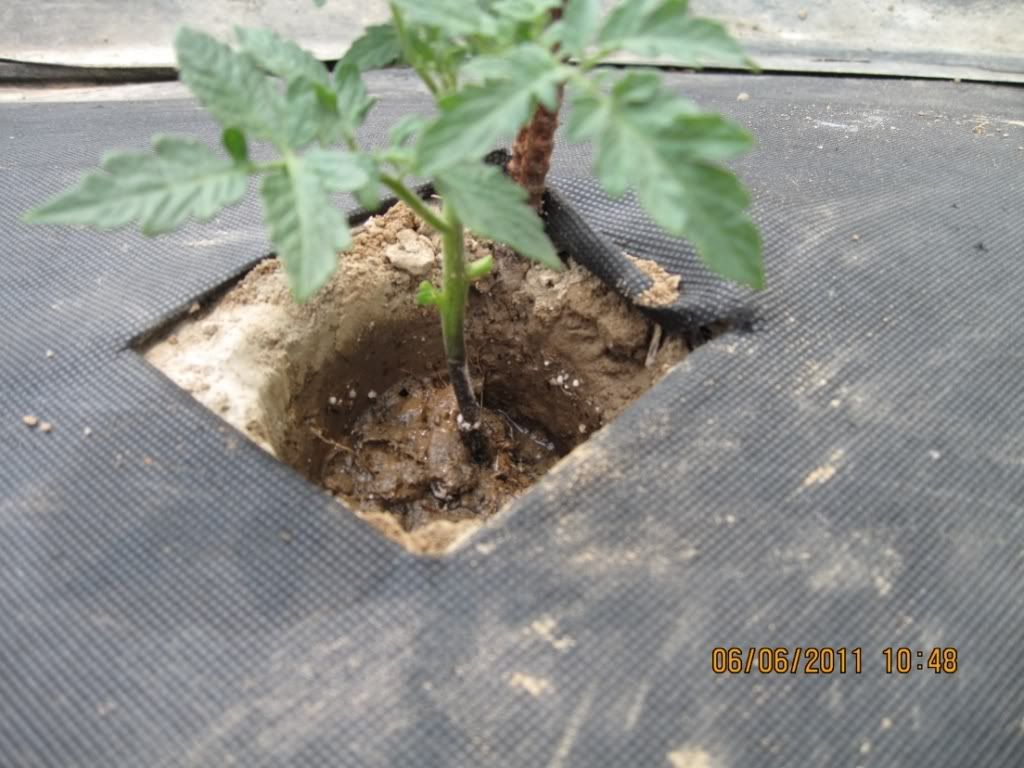
After the water soaks in and settles the loose soil, fill in the remainder of the hole, and build it up to a small pyramid. The next rain or watering will take that pyramid down to level ground and, if it doesn't, that's okay too. At this point if you have not already fertilized your soil, place a tablespoon or two of a good tomato fert around the base of the plant. DO NOT let the crystals touch the stem!
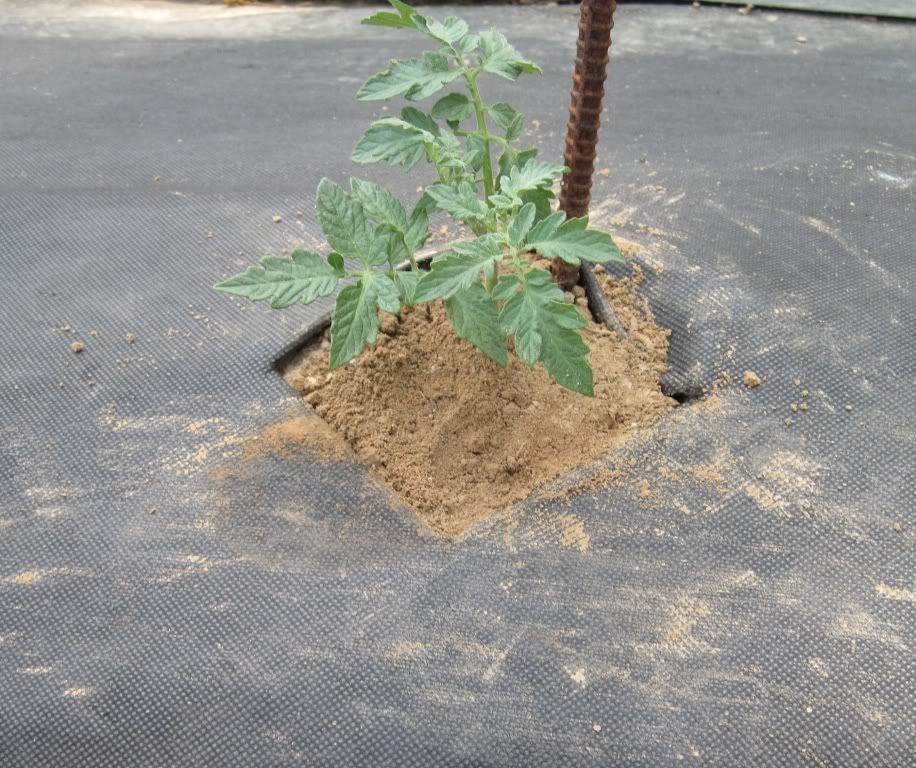
My final step is unfolding the landscape fabric to cover the soil, and standing back to watch the growth!
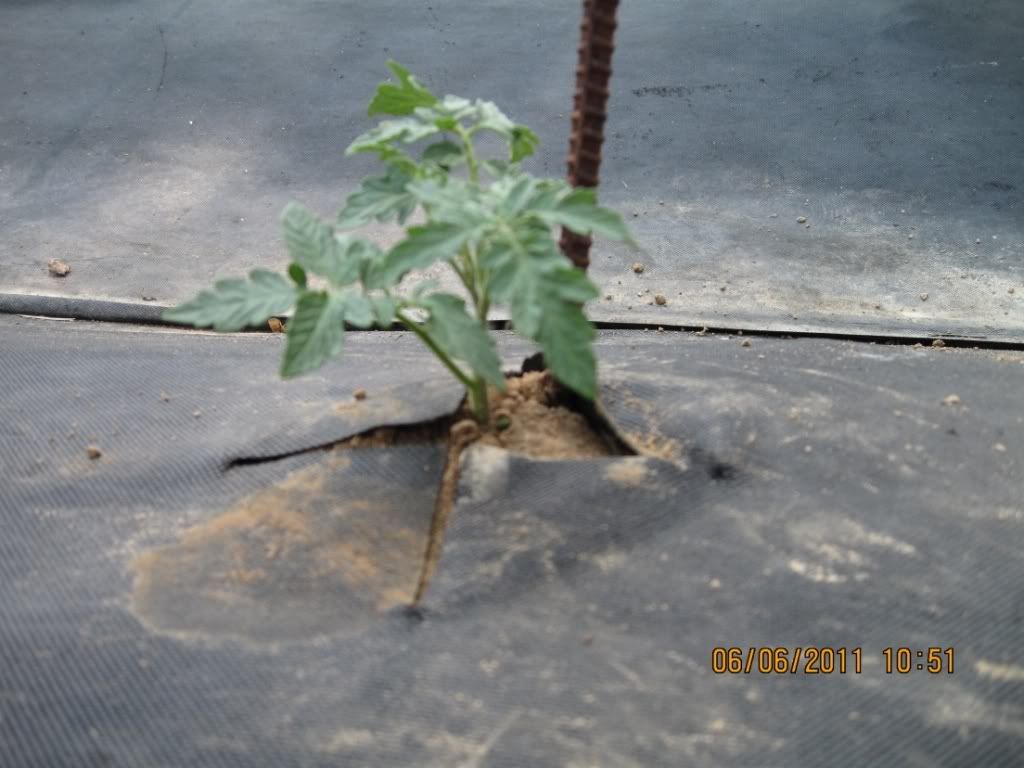
.

The Weekly Gardening Thread is a weekly gathering of folks that love soil, seeds and plants of all kinds. From complete newbies that are looking to start that first potted plant, to gardeners with some acreage, to Master Gardener level and beyond, we would love to hear from you.
This thread is non-political, although you will find that most here are conservative folks. No matter what, you won’t be flamed and the only dumb question is the one that isn’t asked.
It is impossible to hijack the Weekly Gardening Thread ... there is no telling where it will go and that is part of the fun and interest. Jump in and join us!
I went to the Harrison County Extension Service this morning and picked up the instructions and a soil sample bag. I also Met the local County Agent and he said once I get my results back from Stephen F. Austin State Univ. to stop by and he would explain what it means and everything I need to do for my veggie garden, nice people!
I have already dug my samples (10) and they are mixed thoroughly together now and sitting in the bag ready to be mailed off. One big (maybe) problem I found while taking the soil samples - the owner of this property had laid a brick paved walkway of some sort, years ago, and it is completely hidden about an inch below the grass surface right in the center of my planed garden area. I have not determined it’s extent yet. I am glad I found it before trying to till up the area.
Wow a chicken garden. How do you plant the eggs?
It would have been ugly to hit bricks with the tiller.
Good luck with the garden.
Right, that has got to be the way to do it!
I have all kinds of things I could use to raise the shorter plants closer to the lights.
Thanks so much!
I seeded Spanish Onions and California Poppy on Monday. The first frost free date here is the third week of May, but it’s so warm here right now that I am tempted to sow some lettuce in a raised bed. LOL.
I just checked your home page to see what state you’re in, and I must say I love your picture! You just GO, Elf Girl !
LOL, Good for you!
We get the same weather. I’m in zone 4A/B, and am afraid to start my seeds too early. This warmth is so tempting!
How are you doing AftR and Diana?
Do you remember how long it took for you get the results back from your soil test? Did they mail it or send it via e-mail?
The tiller I was renting over in Mississippi was a Brute also. I used it just to break up the sod for the first time and then a couple passes to get a deep till. I used my housewife tiller to do some final tilling.
In my current situation I will need to rent another brute of a tiller here in Marshall, Tx.
Bust it up good! Add some good compost to fluff it up, hold the moisture, and keep it from compacting.
I’m sort of lucky because my dog lived in my back yard for 16 yrs till he died. The dirt is black as coal, and there are earthworms back there as big as cobras!
Just in some places I’m still not sure how many/big rocks there are, so last year, I used the spade.
Every time I use that tiller I’m astounded that it even starts...!!
(But I am pretty good with small engines)
And I bought some strawberry plants today, I have another spot about 25X12 feet that I’m gonna do totally with berries.
Might pick up some path stones to make a walkway in it...
The small tiller that I have was bought about 15 years ago by my Father. I found it in his storage unit after he died. It was still in its original box. It is very, very hard to start. But once it is running it wont quit until you hit the kill switch.
Have you looked into strawberry tower planters?
I’m doing fine, except that my knees are still bothering me from that fall I took in the ice in Jan. It was 70 degrees here today, and it’s tempting to hit the garden store. I have to pinch myself and remember that it is only March. We start planting here in May.
Get a can of starter fluid, and choke it good when you go to start it. Save you alot of frustration.
Most small engines will have a bit of a vapor lock in the carb if they’ve sat for even a couple hours.
Once it’s been going for three minutes or so, if you shut it off it should re-start immediately with one pull.
If it runs after that, but intermittently stops, check the fuel filter. If it has been a while since you used it and it had older gas in it, DUMP OUT ALL OLD GAS AND USE FRESH GAS ONLY!
I’ve literally seen a half inch of water in a quart of gas I dumped out of the tiller after setting over winter. Most gas these days have ethanol in it, and it will absorb water right out of the atmosphere.
It was quick, about a week to ten days, but mine went to Texas A&M at College Station. They mailed the anlyasis to me. But a week is not quick enough with planting time upon us, but you should still be in good shape.
Thanks!
Good Info, Thanks.
Any gal with a bow and arrow is good in my book!
I’m having the same trouble. Aren’t these temperatures wonderful? If they don’t last tho...
I really want to seed some lettuce outside.
Knees are a pain in the..... ;-)
JDB, those photos and your instructions are priceless! I’m going to try it this year. Oh, and could you add me to your ping list as well? Thank you!
Me too.
Mmmmm. Meat. (Because we don't hunt lettuce with an arrow.) :-D
Do you actually do archery Ellendra? I used to, and I loved it.
Disclaimer: Opinions posted on Free Republic are those of the individual posters and do not necessarily represent the opinion of Free Republic or its management. All materials posted herein are protected by copyright law and the exemption for fair use of copyrighted works.